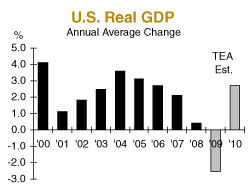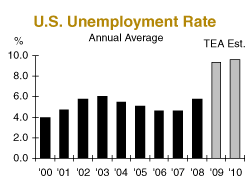|
December 2, 2009
Outlook 2010
Written by Jeff Thredgold, CSP, President, Thredgold Economic Associates
 The U.S. Economy The U.S. Economy
…growth has returned
The American economy finally returned to “growth mode” during 2009’s second half, fueled in part by extremely aggressive fiscal and monetary stimulus. Pent-up demand by consumers, combined with stronger global performance, also added to growth numbers. A return to positive U.S. economic growth does not imply that problems with commercial real estate, housing, and emotional financial markets are finally behind us, but it clearly helps.
The revised 2.8% inflation-adjusted annual growth pace during the third quarter was a major departure from the 6.4% real annual rate of decline during 2009’s first quarter. A similar 2.6%-3.0% real growth pace seems likely in coming quarters.
The longest, deepest, most painful, and most pervasive recession since the Great Depression has officially been with us since December 2007. Good Riddance!
Budget Deficits
…the record books
Financial realities tied to the Great Recession, combined with aggressive spending by both the Bush and Obama Administrations to stabilize the economy, contributed to a budget deficit of $1.4 trillion during fiscal year 2009, which ended last September 30, easily the largest on record. A similar deficit is likely this fiscal year as well.
Perhaps the greatest challenge to be addressed over the next 12-18 months is how to reduce estimated deficits averaging $1 trillion annually during the next eight years, which are simply unaffordable. The President will face rising opposition to his aggressive spending agenda by more and more members of his own party, many who fear having to defend such spending to voters in 2010 elections.
 Unemployment Unemployment
…more job pain
For the first time since the Great Depression, total job losses during a recession have wiped out total employment gains during the prior expansion. More than seven million people have lost jobs since the recession began two years ago, with millions more shifted to part-time employment. Even more job losses are expected during the next few months, followed by a mix of good and bad employment reports as 2010 matures.
The current 10.2% U.S. jobless rate (a 26-year high) could approach 10.6% in coming months. Unfortunately, high jobless rates will be the norm during the next few years, with hundreds of thousands of jobs in construction and manufacturing lost for good.
Inflation
…a major debate
The Consumer Price Index (CPI) declined 0.2% during the most recent 12-month period. This followed a 0.1% rise during 2008, the smallest rise since 1954. When all is said and done, most forecasts expect the CPI to rise roughly 2.0% in both 2009 and 2010.
Where we go from there is the subject of intense debate. One vocal group of economists sees a Japanese-style deflation unfolding in coming years, tied to weak residential and commercial real estate values, strong productivity gains, major slack in labor markets, and nervous consumers. The other camp sees major inflation pressures resulting from highly aggressive monetary policy and massive budget deficits.
The Federal Reserve
…how to exit
The Fed’s critical federal funds rate, now at an all-time low of 0.00%-0.25% for a year, will likely remain at that level well into 2010. The Fed has enacted one unprecedented program after another, known as “quantitative easing,” to address the near-paralysis that, at times, plagued financial markets during the past 30 months. Whether the Fed will be able to effectively reverse such steps in coming quarters without economic disruption remains unclear.
Long-Term Interest Rates
…time is now
NOW is a very attractive time to refinance a mortgage or buy a new home or foreclosed property. Mortgage rates for conventional loans have been at or near 40-year lows in recent weeks. Mortgage finance for higher-priced homes remains spotty in too many communities. Unfortunately, one in four U.S. home owners are now “underwater” on their mortgages…owing more than the home is worth.
|
Holiday Special
As you gather with your family in coming weeks, consider giving a copy of Jeff Thredgold’s A Parent’s Letter to My Children in School to each of your children or grandchildren.
This beautifully illustrated book of advice is especially tailored to students from junior high through college, with practical and timely advice about school, learning, and life. But its simple wisdom spans the generations and would benefit all children (and children at heart)—from 8 to 88!
Only $5.95
Now through December 31, A Parent’s Letter to My Children in School is only $5.95 (regularly $8.95). Attractive quantity discounts are also available, and we offer free shipping on all orders over $29. Click below or call us at 1-888-THREDGOLD (847-3346).
• Learn More or Place Your Order
|
|
Housing
…more stable prices
More housing markets around the nation have stabilized, following the most painful downward adjustment to U.S. home values since the Big D. While further price adjustments are likely in markets that simply got carried away during 2003-2007, modest home price gains could become the norm in numerous communities in 2010.
The Global Economy
…a solid 2010?
The global economy returned to growth faster than expected during 2009’s final few months, led by an Asian resurgence. Renewed growth follows the first global recession since just after World War II.
China’s economic growth engine reaccelerated in recent months, following weaker performance 9-12 months ago. Powerful growth has been fueled by massive government spending and aggressive bank lending. China is making efforts to boost domestic demand within its economy, while lessening its dependence upon exports.
Japan returned to modest growth during the most recent quarter, following this nation’s most painful recession since just after World War II. Even so, ongoing economic growth prospects are limited, tied to a massive public debt, an aging (and declining) population, and millions of disillusioned consumers who have lost faith in the prospect of rising living standards following 20 years of economic stagnation.
India’s economy has picked up speed in recent months after recession-induced slowing. Solid growth is likely over the next 12 months. India joined China and Indonesia as the three Asian nations to avoid serious recession during the past year (Reuters).
The European economy returned to modest growth during the most recent quarter, led by Germany. Even so, euro strength versus the dollar has led anxiety levels sky-high in export and tourism-focused sectors. The U.K. remains in recession, with minimal growth likely during 2010.
Russia continues to struggle with an overdependence upon energy and commodity prices. Various Middle Eastern nations are trying to limit the damage from Dubai’s recent major debt challenges.
Most South American nations have seen more signs of recent economic improvement, even as major challenges of “doing business” remain. Major oil finds off Brazil’s coast could impact global energy dynamics in coming years.
Mexico remains mired in recession, tied in part to declining oil revenue and major hits to its critical tourism sector. Very aggressive pricing in resort communities should help limit the pain during 2010. The Canadian economy seems in transition to modest growth following its own recession. Even so, total employment is down 400,000 from its October 2008 peak.
The Bottom Line?
The painful and lengthy U.S. recession has finally given way to a reasonable growth pace, although serious challenges remain. We also expect…unprecedented budget deficits in coming years…mixed employment news…modest inflation this year and next…extremely low short-term and attractive long-term interest rates, with stable housing markets…and an improving global economy.
• Email this article to a friend
• Learn about econAmerica, Jeff’s latest book
|
|
Subscribe to the Tea Leaf
Like what you just read? Have Jeff Thredgold’s Tea Leaf emailed to you free each week. Subscribe today.
|
|
|

“Tea”ser
I went to buy some camouflage trousers the other day, but I couldn’t find any.

“Tea”stimonial
“We thoroughly enjoyed having you as our featured speaker at the recent Annual Meeting of the Pine Chemicals Association in Key Largo, FL. Your comments on current and future economic conditions were informative, thought provoking, and humorous. We received excellent feedback from those attending the conference. You helped to make the program a ‘no hassle event’.”
• More testimonials
Invite Jeff Thredgold to speak at your next conference, meeting, or client function
If you like the Tea Leaf, you’ll love Jeff Thredgold’s live presentations. Jeff takes your audience on a timely, engaging, and entertaining tour of the U.S. economy and financial markets. Debunking some of today’s most common economic myths, he offers a clear picture of how the American economy is really performing and what that means for the future of your finances.
• ***Watch Jeff Thredgold’s new demo video.***
• Download more information that you can e-mail to other decision makers.
• See Jeff Thredgold’s speaking calendar.
• Tell us about your event using our online form and we will contact you. Or, is there an individual in your organization you would like us to contact?
• Give us a call at 1-888-THREDGOLD (847-3346) to ask about Jeff’s availability and pricing for your event, or for any other information.
|
